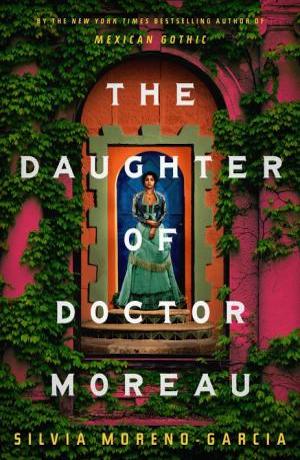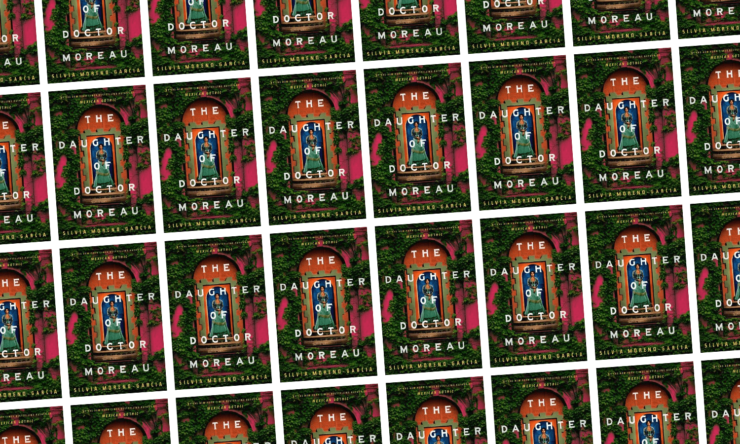H.G. Wells’ The Island of Doctor Moreau has seen its share of retellings and adaptations since it was first published in 1896. Silvia Moreno-Garcia’s The Daughter of Doctor Moreau is another one of these retellings, but to simply categorize as such does this story an injustice.
Moreno-Garcia takes the initial premise of Wells’ work—a scientist undergoing questionable experiments in a remote area—and uses that as a jumping off point to tell a new story that touches on themes Wells never considered.
You don’t really need to know anything about Wells’ original book besides the above, in fact, to appreciate Moreno-Garcia’s novel. I should add, however, that while many consider The Island of Doctor Moreau to be horror, Moreno-Garcia’s version is more historical sci-fi and isn’t as dark as Mexican Gothic, Moreno-Garcia’s most-read work to date.
While The Daughter of Doctor Moreau doesn’t go as dark as one might think, it doesn’t shy away from hardships and heartbreak. The story takes place in 19th Century Mexico, specifically on the Yucatán peninsula, an area so remote that it was often referred to as an island. There, we find Carlota Moreau, the young, dutiful daughter of the doctor who spends his time creating animal-human hybrids to ostensibly further his scientific pursuits.
Buy the Book


The Daughter of Doctor Moreau
We experience much of this story through Carlota’s perspective. In the beginning, she is a young girl whose whole world is Yaxaktun, the settlement in the Yucatán where Dr. Moreau conducts his “research” through support from his patron, Fernando Lizdale. Carlota loves Yaxaktun. She loves the land, and she loves the hybrids her father has created, especially Lupe and Cachito, the two who grew up with her and are her siblings in every way that matters. Carlota also loves her father and has done everything she can to be the meek and obedient daughter he expects.
One day, however, Lizdale’s son Eduardo stumbles into Yaxaktun and becomes enamored with Carlota. Carlota becomes enamored with him in turn, and his presence catalyzes an inevitable shift in life on the settlement. Eduardo’s father wants to stop funding Moreau—Lizdale’s only interest in the hybrids was for slave labor, and his hopes for that aren’t panning out. And when he finds out that his son is interested in Dr. Moreau’s born-out-of-wedlock daughter, he takes the news less than well. Add in the external factor that the local people are fighting against the British to keep themselves and their land free, and things come to a violent head before the book’s end.
Carlota has her own feelings and her own journey through all of this, and it’s here where Moreno-Garcia gives Wells’ story a refreshing twist by having Carlota fully realize her own personal wants and power. The Daughter of Doctor Moreau touches on themes found in Wells’ book such as the morality surrounding science and religion, but it also touches on topics that Wells ignored, such as colonialism, racism, and how women struggled (and still struggle, frankly) to claim their own power and their own inherent worth in a world that treats them as less than human.
This isn’t happy stuff, but it’s Carlota’s love of Yaxaktun and the hybrids, as well as the others around her, that keep the story afloat. You find hope through Carlota’s strength, and you can’t help but be swept up in her journey as she struggles with the changing world around her and the inevitable pain that comes from realizing that some love comes with strictures on how she must act and, fundamentally, the role in life she is expected to play.
The Daughter of Doctor Moreau is a complex story, but at its core, it is a story about love. And like many stories about love, there is a fair amount of heartbreak, and not just for Carlota. Montgomery Laughton, Yaxaktun’s alcoholic mayordomo, is haunted by his own heartbreak. At the beginning of the book, when he first comes to Yaxaktun, he is a broken man not interested in picking up the pieces. And while Laughton might not be fully mended by the end of the novel, he is starting to put himself back together, and we get an intimate look at him deciding and then striving to do right in the chapters told from his point of view.
The hybrids—especially Lupe and Cachito—have their own journey. They are ever-present but in the periphery, although we get glimpses of Lupe and Cachito’s fundamental desire to be free of Dr. Moreau’s control as well as Lupe’s sisterly love for Cachito. One could even argue that Lupe, with her boldness, braveness, and unflinching resolve to protect those she loves, is the true hero of the story. We never see things from Lupe’s point of view, and I can’t help but wonder how she would convey the events of the book compared to Carlota and Laughton.
Through all of these characters, however, Moreno-Garcia weaves a story about how life is often hard and full of unwanted surprises, and how finding your own inner strength to face these challenges is as important as accepting help from those who love you, just as you are.
It’s a story you can get lost in, and it’s a tale whose bittersweetness will pull on your heart just enough for it to ache but will also leave you with hope that the characters are moving on to something better, no matter how hard getting there may be.
The Daughter of Doctor Moreau is published by Del Rey.
Vanessa Armstrong is a writer with bylines at The LA Times, SYFY WIRE, StarTrek.com and other publications. She lives in Los Angeles with her dog Penny and her husband Jon, and she loves books more than most things. You can find more of her work on her website or follow her on Twitter @vfarmstrong.










